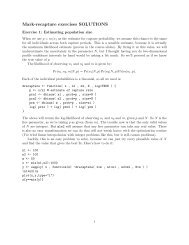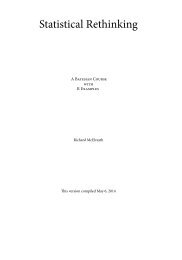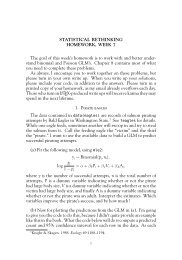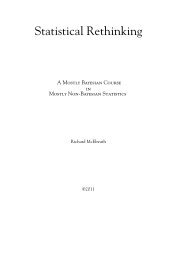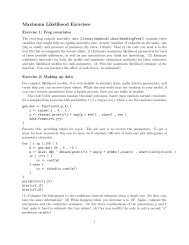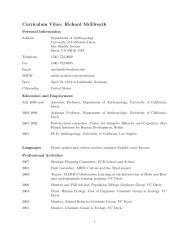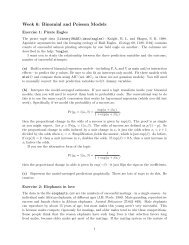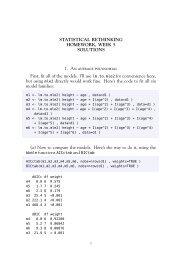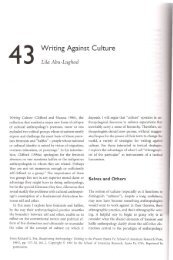the relation of habitual thought and behavior to language
the relation of habitual thought and behavior to language
the relation of habitual thought and behavior to language
Create successful ePaper yourself
Turn your PDF publications into a flip-book with our unique Google optimized e-Paper software.
RELATION OF HABITUAL THOUGHT AND BEHAVIOR TO LANGUAGE<br />
'earnestly hoping .' Thought power is <strong>the</strong><br />
force behind ceremonies, prayer-sticks,<br />
ritual smoking, etc. The prayer-pipe is regarded<br />
as an aid <strong>to</strong> 'concentrating' (so<br />
said my informant) . Its name, na'twanpi,<br />
means 'instrument <strong>of</strong> preparing.'<br />
Covert participation is mental collaboration<br />
from people who do not take part<br />
in <strong>the</strong> actual affair, be it a job <strong>of</strong> work,<br />
hunt, race, or ceremony, but direct <strong>the</strong>ir<br />
<strong>thought</strong> <strong>and</strong> good will <strong>to</strong>ward <strong>the</strong> affair's<br />
success. Announcements <strong>of</strong>ten seek <strong>to</strong> enlist<br />
<strong>the</strong> support <strong>of</strong> such mental helpers as<br />
well as <strong>of</strong> overt participants, <strong>and</strong> contain<br />
exhortations <strong>to</strong> <strong>the</strong> people <strong>to</strong> aid with<br />
<strong>the</strong>ir active good will . 10 A similarity <strong>to</strong><br />
our concepts <strong>of</strong> a sympa<strong>the</strong>tic audience or<br />
<strong>the</strong> cheering section at a football game<br />
should not obscure <strong>the</strong> fact that is is primarily<br />
<strong>the</strong> power <strong>of</strong> directed <strong>thought</strong>, <strong>and</strong><br />
not merely sympathy or encouragement,<br />
that is expected <strong>of</strong> covert participants . In<br />
fact <strong>the</strong>se latter get in <strong>the</strong>ir deadliest work<br />
before, not during, <strong>the</strong> game! A corollary<br />
<strong>to</strong> <strong>the</strong> power <strong>of</strong> <strong>thought</strong> is <strong>the</strong> power <strong>of</strong><br />
wrong <strong>thought</strong> for evil ; hence one purpose<br />
<strong>of</strong> covert participation is <strong>to</strong> obtain<br />
<strong>the</strong> mass force <strong>of</strong> many good wishers <strong>to</strong><br />
<strong>of</strong>fset <strong>the</strong> harmful <strong>thought</strong> <strong>of</strong> ill wishers .<br />
Such attitudes greatly favor cooperation<br />
<strong>and</strong> community spirit. Not that <strong>the</strong> Hopi<br />
community is not full <strong>of</strong> rivalries <strong>and</strong> colliding<br />
interests . Against <strong>the</strong> tendency <strong>to</strong><br />
social disintegration in such a small, isolated<br />
group, <strong>the</strong> <strong>the</strong>ory <strong>of</strong> 'preparing' by<br />
<strong>the</strong> power <strong>of</strong> <strong>thought</strong>, logically leading<br />
<strong>to</strong> <strong>the</strong> great power <strong>of</strong> <strong>the</strong> combined, in-<br />
10 See, e .g ., Ernest Beaglehole, Notes on Hopi<br />
Economic Life (Yale University Publications in<br />
Anthropology, No . 15, 1937), especially <strong>the</strong><br />
reference <strong>to</strong> <strong>the</strong> announcement <strong>of</strong> a rabbit hunt,<br />
<strong>and</strong> on p. 30, description <strong>of</strong> <strong>the</strong> activities in<br />
connection with <strong>the</strong> cleaning <strong>of</strong> Toreva Spring<br />
-announcing, various preparing activities, <strong>and</strong><br />
finally, preparing <strong>the</strong> continuity <strong>of</strong> <strong>the</strong> good<br />
results already obtained <strong>and</strong> <strong>the</strong> continued flow<br />
<strong>of</strong> <strong>the</strong> spring .<br />
tensified <strong>and</strong> harmonized <strong>thought</strong> <strong>of</strong> <strong>the</strong><br />
whole community, must help vastly<br />
<strong>to</strong>ward <strong>the</strong> ra<strong>the</strong>r remarkable degree <strong>of</strong><br />
cooperation that in spite <strong>of</strong> much private<br />
bickering <strong>the</strong> Hopi village displays in all<br />
<strong>the</strong> important cultural activities .<br />
Hopi 'preparing' activities again show a<br />
result <strong>of</strong> <strong>the</strong>ir linguistic <strong>thought</strong> background<br />
in an emphasis on persistence <strong>and</strong><br />
constant insistent repetition . A sense <strong>of</strong> <strong>the</strong><br />
cumulative value <strong>of</strong> innumerable small momenta<br />
is dulled by an objectified, spatialized<br />
view <strong>of</strong> time like ours, enhanced by<br />
a way <strong>of</strong> thinking close <strong>to</strong> <strong>the</strong> subjective<br />
awareness <strong>of</strong> duration, <strong>of</strong> <strong>the</strong> ceaseless<br />
'latering' <strong>of</strong> events . To us, for whom time<br />
is a motion on a space, unvarying repetition<br />
seems <strong>to</strong> scatter its force along a row<br />
<strong>of</strong> units <strong>of</strong> that space, <strong>and</strong> be wasted .<br />
To <strong>the</strong> Hopi, for whom time is not a<br />
motion but a 'getting later' <strong>of</strong> everything<br />
that has ever been done, unvarying repetition<br />
is not wasted but accumulated . It is<br />
s<strong>to</strong>ring up an invisible change that holds<br />
over in<strong>to</strong> later events." As we have seen,<br />
it is as if <strong>the</strong> return <strong>of</strong> <strong>the</strong> day were felt<br />
as <strong>the</strong> return <strong>of</strong> <strong>the</strong> same person, a little<br />
older but with all <strong>the</strong> impresses <strong>of</strong> yesterday,<br />
not as 'ano<strong>the</strong>r day,' i .e . like an<br />
" This notion <strong>of</strong> s<strong>to</strong>ring up power, which<br />
seems implied by much Hopi <strong>behavior</strong>, has an<br />
analogue in physics, acceleration . It might be<br />
said that <strong>the</strong> linguistic background <strong>of</strong> Hopi<br />
<strong>thought</strong> equips it <strong>to</strong> recognize naturally that<br />
force manifests not as motion or velocity, but<br />
as cumulation or acceleration . Our linguistic<br />
background tends <strong>to</strong> hinder in us this same<br />
recognition, for having legitimately conceived<br />
force <strong>to</strong> be that which produces change, we<br />
<strong>the</strong>n think <strong>of</strong> change by our linguistic metaphorical<br />
analogue, motion, instead <strong>of</strong> by a pure<br />
motionless changingness concept, i.e., accumulation<br />
or acceleration. Hence it comes <strong>to</strong> our<br />
naive feeling as a shock <strong>to</strong> find from physical<br />
experiments that it is not possible <strong>to</strong> define<br />
force by motion, that motion <strong>and</strong> speed, as also<br />
'being at rest,' are wholly relative, <strong>and</strong> that<br />
force can be measured only by acceleration .<br />
2 09



